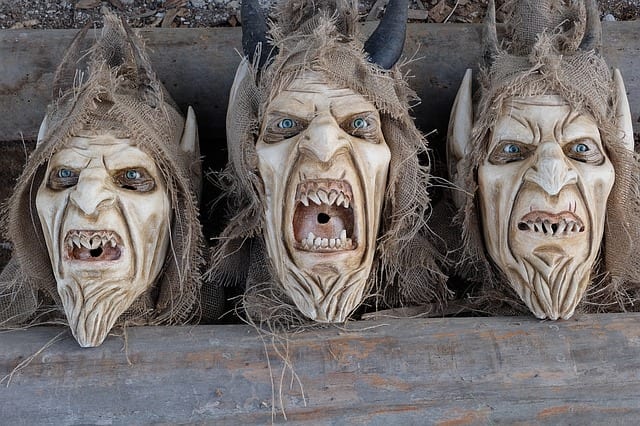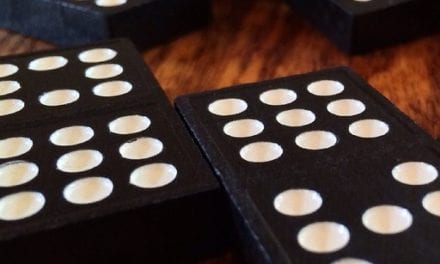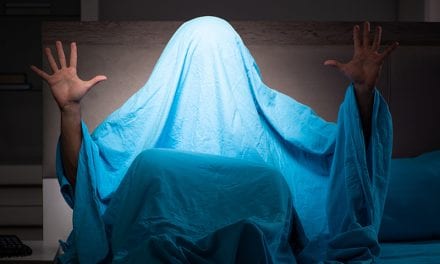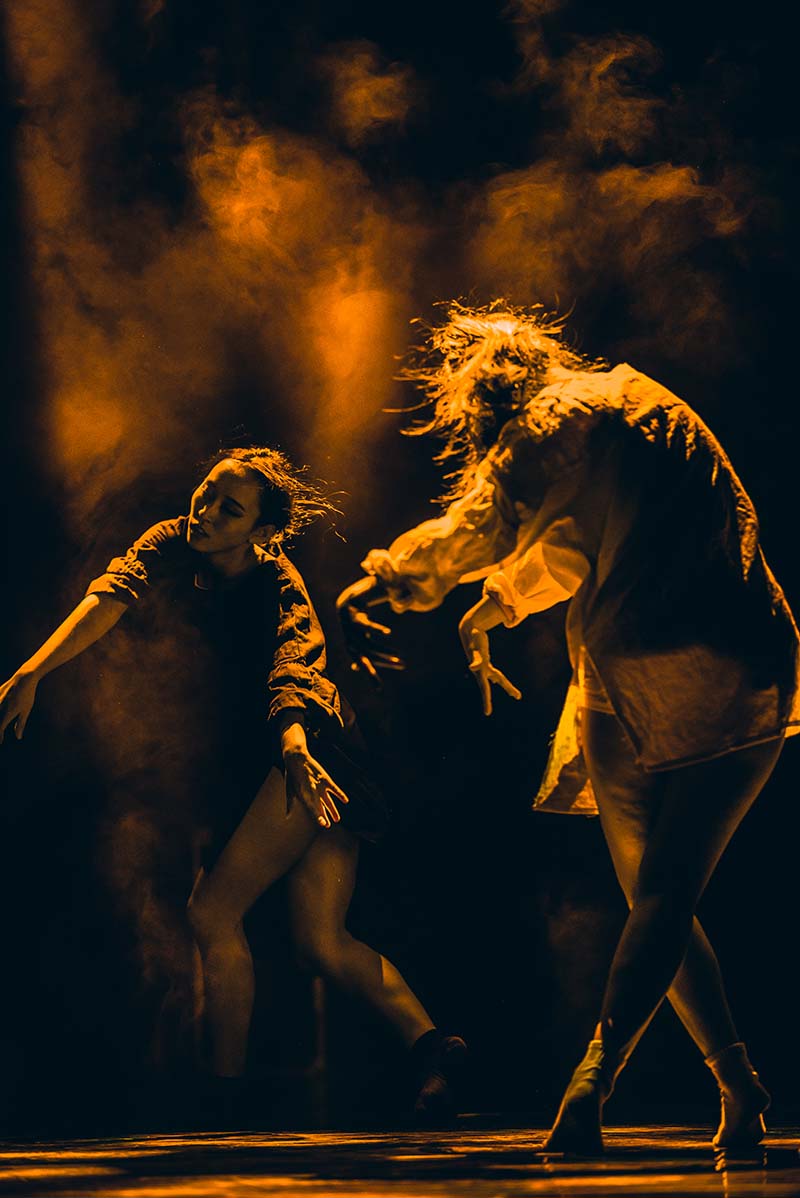Ambrosia Woolf was a gifted maker of masks. She picked up the skill when she was eighteen while working on an ocean liner called the Namaste. A puppeteer by the name of Bruno Gasparro had taught her in-between his performances for the passengers of the luxury cruise, and she picked it up quick. By the second week of her first cruise, Ambrosia had already mastered plaster and clay and had begun carving masks from wood. By the end of the cruise she had mastered that one too. Bruno told her she had a great talent for the art; a true prodigy. It had taken him years just to get plaster masks right, he told her.
When the first cruise had finished—a month long excursion around Asia and Africa, ending in Europe—she decided to sign on for a second one. Bruno would be going as well, and besides being completely taken with the art of mask making, Ambrosia had become taken with Bruno. He was in his early forties, with dignified grey at his temples and a smile that cocked to one side. Bruno would sing beautiful songs to her in Italian as they lay in bed, and when they made masks together he would teach her by moving her small soft hands with his large calloused ones. When they would finish for the night, Bruno would kiss Ambrosia on the nose and say, “a presto, amore mio.”
Ambrosia thought she and Bruno would last all their lives, but it turned out she was even better at making masks than Bruno had led her to believe, and their affair was short lived. A wealthy art dealer aboard her second cruise bumped into Ambrosia after she left Bruno’s quarters one night and paid her 250 dollars for the wooden mask in her hands. That was that for Ambrosia—the realization that she could make art and money.
At the end of their second cruise, she quickly told Bruno it was over and she toured the world’s best mask shops and apprenticed with the world’s top crafters. She jumped from apprenticeship to apprenticeship, learning the best techniques each one had to offer. When she decided she had surpassed one maker, she would bolt in the night—always with a fist-full of bills from the cashbox—and seek out her next teacher. After twenty years of this routine, she took the skills—and the money—she had acquired and set up shop in the tiny town of Calvernville.
Her shop was small, but it was sufficient. She worked for hours on masks of all sizes, all shapes, all styles. She worked with plaster, and with clay, and with wood, and she worked with stone and gold and aluminum and mud and anything she could get her hands on. She would try any material. She once made a mask out of a steaming pile of excrement left on the sidewalk by a neighborhood stray, just to see what it would look like. Nothing was off limits to Ambrosia; anything could be a mask.
The inside of her store was lined with tall stands displaying her masterpieces under the scrutiny of bright lights. She was prolific with her art and every piece meant something to Ambrosia, every piece had something to say to the world and she would allow it no other way. Once, a man came into her shop with a bag of solid gold beads worth upwards of fifty-thousand dollars and offered it to her in exchange for a custom-made mask. She shook her head and violently pushed him out of the store. Ambrosia had no time for people who wanted to dictate what she would make—no one told Picasso what to paint! Despite her proclivity to, quite literally, spit in the eye of those who sought to be clients, Ambrosia Woolf’s business soared. She had become one of—if not the—top mask maker in the world, and with a title like that she could push a person’s nose in dog-shit and they would still hand her a wad of cash for an original Ambrosia Woolf.
She became extraordinarily wealthy as the years passed, yet she maintained her small, provincial shop—her masks were never gauche or gaudy, so why should her store be? She remained in that shop in Calvernville for four-and-a-half decades, and she was happy. She was happy making magnificent art and selling it to people who appreciated such art. She was happy being interviewed by international magazines and receiving prestigious awards, and at the end of the day, she was happy to come back to her cozy little shop. Ambrosia was happy, until she began to realize that time had little left to give her. Eighty-three years had taken a toll on her body. She was no longer productive, only making a mask once a year, if that—what she did make was never good enough to sell. It wasn’t for lack of creativity or imagination, she still had plenty of that. It was her hands; they weren’t as steady as they once were. Her happiness fled at the sight of her trembling, leathery fingers.
One night as she glumly dusted her masks, Ambrosia decided that eighty-three years was her limit—she’d rather go out on her own terms than fade away in a musty shop and be forgotten by those who revered her. Ambrosia put down her feather duster, and went to the back for a length of rope. She tied a noose at one end, and after ten pathetic attempts, managed to toss it over the rafters. She stood on her work stool, and with her trembling hands, slid her head into the noose. She cried for a while before sniffling herself back to the task at hand. She teetered on the stool a few times, and just as she was about to go through with the deed, there was a knock at the door. She stared at it for a few moments, and only when the knock repeated itself did she regain her balance and take the noose off. She carefully made her way off the stool and shuffled toward the door.
“Yeah? What do you want?” She spoke through a small crack in the frame, her voice rough, agitated by the interruption.
“I am in need of a mask,” a husky male voice replied.
“I’m sorry, but I’m closed for the evening. Come back tomorrow.”
There was a pause, and then the voice answered. “We both know you won’t be in tomorrow.”
Ambrosia narrowed her eyes suspiciously at the door.
“Why would you say that?” she asked.
“Because tomorrow is Saturday, Miss Woolf, and your sign says you’re closed on Saturdays.”
Ambrosia sighed.
“Please, Miss Woolf. Acquiring this mask is very important to me. It’s imperative that it be done tonight.”
Ambrosia thought about it for a moment. She had always been loyal to her customers and her customers had been loyal to her, and since she wouldn’t be in the store tomorrow—or any other day after that—she reluctantly agreed. She told him to wait a moment as she slowly pulled the rope down from the rafters, placing it in a cabinet at her work table.
What she saw when she opened the door took her by surprise. From the voice, she had expected a large hulking man, maybe with a scraggly beard or matted hair. Instead she saw a slender gentleman with a fresh, handsome haircut, wearing a well-fitting green suit and black tie. The man made a small humble bow before speaking.
“Ah, the legendary Ambrosia Woolf,” he said. “It is the biggest honor.”
“I’m sure it is,” she said, crabbily. “Well, you know who I am, now who are you?”
“Forgive me, Miss Woolf,” the man said and gave another humble bow. “I go by the name of Edwin Alastor Beels.”
“Well, Mr. Beels, come in and find the mask you want so I can get to bed. I’m an old lady, if you haven’t noticed, and old people need rest.”
“Yes,” he agreed and entered the shop. “You are too kind, Miss Woolf.”
Mr. Beels strolled around the shop examining every piece Ambrosia had on display. He gently picked one up—a black and yellow piece modeled after a silk-voiced crooner from her heyday—and held it parallel to the floor at eye level, examining the fine work around the nose and cheeks. He did this to every mask in the shop as Ambrosia sat watching from her stool. Her patience was dwindling.
“These are all fine,” he said, replacing an iron Tiki mask on its stand. “I mean, really, it’s beautiful work. Even more stunning in person. Really, very fantastic, but do you have any others? Maybe some in the back?”
“What you see is what I’ve got, Mr. Beels. The back room is just where I lay these old bones at night—which I’d like to do soon. So if you’ll just buy one and leave, sir.”
Mr. Beels smiled and put his arms behind his back.
“Would you be willing to make me a custom mask, Miss Woolf? I’ll certainly make it worth your while.”
“I don’t do customs,” she grunted. “Didn’t you read the sign outside? Says ‘no custom masks’ with a big exclamation point after it.”
“I have money, Miss Woolf,” he said.
“I don’t care about your money, Mr. Beels.”
“No,” he said, softly. “No, money isn’t what you care about is it, Miss Woolf?”
“I’ve got plenty of that,” she said. “I don’t do custom masks, never have. And I don’t intend to start with you.”
Mr. Beels’ smile faded. “That’s too bad,” he said. “I was really hoping I could get exactly what I was looking for.”
“Sorry to disappoint,” she said.
Mr. Beels shuffled around the shop again, casually looking back over the masks.
“Look, even if I made custom masks, I wouldn’t be of much use to you now.”
“Why is that, Miss Woolf?”
“Age has its price,” she said, holding up her shaking, leathery hands. “What you see around you here are the last masks that will ever be made by Ambrosia Woolf.”
Mr. Beels smiled as he walked over to the stool where Ambrosia sat and gently clasped his hands around hers, steadying them. “What if I told you, Miss Woolf, that I could help you with this problem? What if I told you I could make your hands as steady as they were when you were eighteen, aboard the Namaste?”
Ambrosia pulled her hands back. “I’d say you were off your rocker, Mr. Beels!” she said, angrily. “And just how do you know about the Namaste?”
“I like to know things, Miss Woolf,” he said, walking over to a gold and green clay mask by the front door. “Your clay work is magnificent, I would’ve really loved one done in clay.”
Ambrosia watched him pick up and reexamine the mask. She promised herself she would never do custom masks for anyone; she swore it. But just thirty minutes ago she was about to take her own life. If she was too old to make quality art anymore, then why not make one custom mask? Call it a last hurrah at the very end. Mr. Beels had clearly lost his marbles, but what did she have to lose?
“What did you mean by that earlier?” she asked him after a long while.
“What did I mean by what, Miss Woolf?” he said, moving his attention from the mask to Ambrosia.
“About helping me with my problem,” she said. “You said you could make my hands steadier?”
“No, I said I could make your hands as steady as they were when you aboard the Namaste,” he said. The words flowed from his mouth like honey.
“Yeah, that,” she said. “You think you can really do that, huh?”
“I know I can, Miss Woolf.”
She mulled it over once more before agreeing to make Mr. Beels a custom mask—the first one ever made by Ambrosia Woolf.
“Oh, that is excellent news!” he said. “I’ll be by Monday morning with all the details and instructions.”
Ambrosia narrowed her eyes. “I thought you said it was imperative that you get the mask tonight.”
Mr. Beels glanced up to the rafter above Ambrosia, and then back to her. “It was,” he said and walked to the door. “But for a custom Ambrosia Woolf mask, I can wait until Monday.”
The next two days Ambrosia thought of little else but her bizarre meeting with Edwin Alastor Beels. She was excited at the wild notion of being able to make beautiful masks again. She was careful not to get her hopes too high—she couldn’t imagine any possible way of Mr. Beels fulfilling his promise—but she certainly dreamed all day and night about the prospect of youthful hands. She ordered some fresh clay from her old supplier, Alvin Simpson, who was very curious about the sudden phone call—Ambrosia hadn’t ordered supplies from Alvin in three years. He kept his nose clean, however, and took the order with very little questioning. Alvin had learned long ago that you do not question Miss Ambrosia Woolf. She ordered five pounds of the best plasteline he had in stock, and Alvin had one of his boys deliver it to her on Sunday afternoon. She spent that whole night setting up her work table—making sure her tools were in good working order and that the bulbs in her work lamps were fresh. She was ready, just in case that crazy Mr. Beels really did have the means to fix her; a rare medicinal herb from the Amazon, perhaps. Or a top-secret pill from the government. She had to at least be prepared, just in case.
Monday morning rolled around and Ambrosia was up by five o’clock—she hardly slept a wink all night. She sat at her table, sipped on a cup of coffee, and waited. Mr. Beels never said what time he should be expected that morning, so by 9:50 Ambrosia began to think she had dreamed the whole thing up. Eighty-three is pretty old, she thought, maybe I was just hallucinating. At 9:52 there was a knock at the door. Ambrosia moved her shaky hands over the work table as if to ensure that the tools stay put, then she shuffled excitedly to the door and opened it.
Mr. Beels stood before her, dressed as he had been three nights prior, but with the addition of a black bowler derby and a pair of black leather gloves. In one hand he carried a bulging burlap sack, the other he used to cordially remove his hat.
“May I come in, Miss Woolf?” he asked, politely.
“Yes yes yes yes, for goodness sake, get in here!” she said.
He gave a small humble bow and crossed the threshold.
“Where might I put my hat?” he asked. “It’s very delicate.”
“Over there,” she said impatiently, and pointed a shaky finger at a coat rack in the far corner. “So, I have all my stuff ready, Mr. Beels. Can we get on with the mask…and the other thing?”
She said this last part timidly, as if the very mention of Mr. Beels claim would cause it to be a joke.
Mr. Beels smiled. “Of course,” he said and placed the burlap sack carefully on the table.
“I got some new clay in yesterday, the best on the market at that!”
“That wasn’t necessary, Miss Woolf, I’ve brought my own clay.”
She narrowed her eyes. “I like to use my own materials when I work. I know what I like and I know what works best.”
Mr. Beels opened the sack, pulled out a large sphere of black clay with a gloved hand, and placed it gingerly on the table. “I assure you, Miss Woolf, this is a very special clay. Top of the line, you might say. It will suit you fine I’m certain.”
Ambrosia examined the ball of clay closely. “Jolly King?” she asked, pursing her lips. “Never use the stuff!”
Mr. Beels smiled. “No. You won’t find this clay at any store. It’s my own recipe. I thought that, since you were so kind as to break your cardinal rule for me, I would save you the trouble of furnishing the supplies.”
She looked at him for a moment. “Okay fine, I’ll use your clay,” she conceded. “But, you’re forgetting one thing.”
She held her shaking hands up to his eyes.
“Don’t you worry, Miss Woolf,” he said, taking her hands and gently placing them on the orb of clay, “all you need to do is focus on making the mask.”
Ambrosia scowled at him. “Focus on making the mask,” she muttered indignantly. “And just what was it you were wanting me to make you?”
He released her hands and reached into the bag, retrieving a folded piece of yellowed paper. “I would like you to make this.”
He unfolded the paper to reveal an old painted image of a ghoulish horned mask.
She raised an eyebrow. “This is what you want me to make for you?”
Mr. Beels smiled and nodded.
“It’s hideous,” she said.
Mr. Beels said nothing.
“Whatever gets you going, I guess,” she shrugged, and looked at her trembling hands before she began working the clay. “Well, here goes nothing.”
The clay was soft and pliable, holding every shape she pulled and kneaded. While Ambrosia worked, Mr. Beels sat in the corner behind her, his legs crossed, watching with intensity. She moved swiftly, excitedly. Her lamp hung low over the table, illuminating the jagged edges of the cheeks and the sharp points of the three, toothed horns she molded on the forehead. It was the fastest Ambrosia had ever sculpted a mask before, and in one hour she was beginning to add the finishing details to the sharp, jagged, skull-like nose and eyes of the mask.
“Is it finished?” Mr. Beels asked eagerly as Ambrosia put down her tools and pushed the light upwards a tad.
“Yeah,” she said, looking from the mask to the yellowed paper beside her. “Yeah, I’d say I got it pretty good, actually!”
Mr. Beels leapt from the chair and leaned over her shoulder to examine the mask. He marveled at its exquisite likeness to the picture. Ambrosia carefully turned it so that he could get a better look when she noticed her hands.
“My hands!” she exclaimed. “They—they aren’t shaking, not at all!”
“As promised,” Mr. Beels said, straightening up and resting his hands behind his back.
“I never believed you’d actually be on the level!” she said, turning her hands over in front of her eyes. They were even steadier than they were when she was aboard the Namaste. She gazed at them, grinning widely, and when she looked up Mr. Beels was nowhere to be found. There was no trace he had ever been there at all; no paper, no bag, no hat on the coatrack, no mask. He just disappeared. She again considered the idea that she was hallucinating the whole thing. But my hands, she thought, how could I be hallucinating the stillness?
Ambrosia began making masks again at an incredible rate. She would churn out one after another—each one better than the last—and for two weeks straight Alvin Simpson was sending his boy, Kevin, over to Ambrosia’s shop every day. She got clay and wood, and she even got Alvin to find a few ingots of steel for her to melt down too.
“Boy, Miss Woolf,” Kevin said one day while delivering an entire red-wagon-load of clay. “This sure is a lot of clay. Pa says you haven’t been this active in probably fifteen years.”
She ignored the boy’s remarks and continued taking the clay from him as he unloaded the wagon.
“He says it’s mighty odd, you calling so often now,” Kevin continued as he picked up another block of clay and relayed it inside to Ambrosia.
She took the block and glared at him. “You mind your own business, boy,” she said. “I’m an old woman. I don’t have long in this world and if I want to make masks again, by god, I will do it!”
All Kevin could say was “yes, ma’am,” and finish his delivery.
A few weeks later, on a rainy Thursday night Mr. Beels came again to the shop. He tapped on the door as he had before, but this time Ambrosia greeted him as an honored guest instead of an interloper. She took his hat, which was completely dry, and gingerly placed it on the coat rack. Mr. Beels took a seat.
“Some tea or perhaps coffee, Mr. Beels?” she offered her guest, who crossed his legs and rested his gloved hands on his knee.
“No, thank you, Miss Woolf,” he said with a smile.
She shuffled over to a small table by the wall and poured herself a cup of coffee. “To what do I owe the pleasure of this visit?” she said, turning to look at him. “I hope the mask I made you—as ghastly as that thing was—met your needs.”
“Oh, indeed it did,” he said, and looked around at the new additions to her shop. “I see that you have been very busy since then.”
“Oh, like you wouldn’t believe!” she said, sipping her coffee. “Thank you again, for…well, for whatever the hell you did. I’m eternally grateful.”
Mr. Beels smiled again. “I’m glad to hear that, Miss Woolf. I really am, because it seems I require your assistance once again.”
“Oh?” she asked, sitting on her stool facing Mr. Beels. “And what is it you need my assistance for?”
“I was hoping that I might persuade you to make me one more mask.”
“I don’t make custom masks, Mr. Beels,” she said, looking at the coffee in her cup as she sipped it. “What I did for you a few weeks ago, that was a rare occurrence. I was at the end of my rope—so to speak.”
“Yes,” he said, and glanced toward the beam from which she had been prepared to dangle.
“You gave me a gift, Mr. Beels, I don’t know how, but you gave me my art back. For that I thank you. But I made that awful mask for you as payment for this gift. I don’t want to get in the habit of changing my ways.”
He grunted, standing from the chair and walking behind it. He looked around the shop as he spoke avoiding her eyes until he had finished. “Miss Woolf, what do you desire more than anything else in the world?”
Ambrosia looked baffled. “I don’t understand,” she said.
“The thing you want most of all, what would that be?”
She thought about it. She was eighty-three. She had accomplished more than most people her age. She had acquired a decent amount of fame—especially in the art world—and she had made more money than she knew what to do with. She had lived a long time, seen a lot. But for some reason, in that instant she thought about her first love, Bruno Gasparro. How she left him and spent all those years studying and perfecting. She loved making masks, but…
Mr. Beels looked at her like he knew what she was thinking. Like he knew, even before Ambrosia did, what she wanted from this life.
“I…” Ambrosia’s voice trembled as she tried to express the thing that gnawed at her, the desire that had been so silent until that moment.
“You want youth,” he said, smiling. “Isn’t that what you want to say? You want to be young again. All those years you spent on making masks, on becoming the best in the world—you never took the time to slow down. To find love—or pursue it. To start a family, maybe? Isn’t that what you want, Miss Woolf? Time enough to do the things you missed out on all those years ago?”
She nodded slowly as he walked over to her.
“What if I told you,” he said, his husky voice as charming as ever, “that I could give you that?”
She looked at him with wide eyes; unbelieving eyes.
“You…you can do that?” she asked softly.
He nodded. “I can make you young again, Miss Woolf. Twenty-one? Twenty-two? Whatever age you want. What do you think of that?”
She looked at her hands and how still, how calm they were.
“What would I be making?” she asked.
“It’s a very simple request, actually,” he said, gently turning her toward her work table. “I would like you to make a mask of yourself.”
She started to look around at him, but he guided her head back to the table. He pulled an orb of black clay from his coat and placed it in front of her.
“You want me to make a clay mask of my face?” she asked, bewildered.
“Yes,” he said.
“Why on earth would you want a mask of me?”
Mr. Beels did not reply, but he took a photo of Ambrosia from his pocket and placed it next to the black clay.
“Youth, Miss Woolf,” he whispered in her ear and placed his hands on her shoulders. “A husband, children. A second chance.”
Without another word, she lowered her work lamp and began to mold the orb. Mr. Beels’ hands remained on her shoulders the entire time, and she worked with great haste as if something was driving her—pushing her, guiding her hands and fingers along ridges and contours. She worked unblinkingly, and Mr. Beels watched her progress every step of the way, grinning widely as the mask took shape.
Ambrosia’s hands came to an abrupt stop, and she silently handed the mask up to Mr. Beels. He snatched it from her and examined it thoroughly. It was an exact likeness.
“When will I get my youth?” she asked, looking pleadingly around at Mr. Beels.
“It’s yours already,” Mr. Beels said, turning the mask over in his hands.
Ambrosia seemed to glide as she quickly walked across the room. It was an odd sensation to walk so swiftly, with such unobstructed movement. She moved to an old vanity in the corner where some of her earlier, unsold masks now resided, and gazed into its cracked mirror. She looked like she did when she first started working aboard the Namaste. Her skin was smooth—unblemished by pockmarks or liver spots. Her hair was raven black again without a single grey or white strand to be found. Her breasts were perky and sensual once more—in fact, her whole body retained its long lost figure; her hips, her waist. She was filled with childlike enthusiasm. She felt an excitement for life she hadn’t had in decades. Ambrosia was ready to take on the world once more—ready to go out and live the life she had forsaken when she was too busy making a name for herself as a top-tier mask maker. Now she could have her art, and everything else too!
“I can’t believe this,” Ambrosia said, giggling. “I’m a girl again! I’m beautiful!”
She spun around to face Mr. Beels, her eyes bright with excitement. He stood smiling at her, still holding the mask in his hands, but she noticed that his smile had changed. It was more of a snarl than a smile.
“Mr. Beels,” Ambrosia said, “are you okay?”
He was silent, and a shiver ran through Ambrosia. It was fear.
“Mr. Beels?” she said. “Mr. Beels, you’re scaring me. What’s wrong with you?”
Mr. Beels slowly raised the Woolf mask to his face and it was fixed there. She tried to get away—to run to the back room—but before she could get through the doorway he spoke and she was frozen.
“Miss Ambrosia Woolf,” he said. “I am in need of your assistance. But first, I need to make sure of something. I need you to make a phone call.”
Ambrosia said nothing. She turned around in the doorway and faced Mr. Beels, her face blank—devoid of the light it had shone moments before. She walked slowly to the phone in the back and dialed the number as he instructed.
It was a quarter past midnight when Alvin Simpson arrived at Ambrosia’s shop. His eyelids were heavy and he rubbed sleep from them as he waited to be let inside. He carried the supplies Ambrosia had been so insistent that he deliver immediately. She told him it was urgent, and so he obliged her—she was, after all, his best customer. A few moments after he knocked, the door swung open and an arm pulled him inside.
A young Ambrosia, face still lifeless, pulled Alvin so hard that he fell to the floor. Before he had a chance to comprehend what was happening, Ambrosia had straddled his stomach, and plunged a knife into his chest. He began screaming.
“Ambrosia!” he yelled. “Ambrosia, help me! Help! Help!”
She ignored his pleas and continued to plunge the knife into him, over, and over, and over, until he finally ceased his cries for help. She sat on top of Alvin’s body, staring blankly at the blood running from his wounds and pooling around him.
“Very good, Ambrosia,” Mr. Beels said through the Woolf mask, and he started slowly applauding her. “Very good.”
“Now,” he said, crouching down eye level with her and gently placing his hand on her cheek. “Use his bone.”
Mr. Beels held out a small oscillating saw which Ambrosia took from him. Slowly, methodically, Ambrosia used the saw, tracing the outline of Alvin’s face. Blood sprayed up her nose and in her eyes and all over her hair, but she continued. When she finished cutting through the skull, she carefully pried the face from muscle and sinew. She began idly humming as she held it up and examined it.
She took it to her work table and scraped the remains from the backside, tossing them into a pile on the floor. Once it was relatively clean, Ambrosia carefully tacked the edges of loose skin to the backside of the skull to keep it from sliding off. When she was finished, Mr. Beels took the crude flesh-and-bone mask from her hands and placed it gently on her face. She gazed up at him—into the black-clay mask of her former self.
“Come with me, Ambrosia,” he said. “We have much to do.”
She followed slowly in his wake as they left the shop and walked down the street.




















